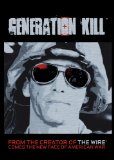| Reviews & Columns |
|
Reviews DVD TV on DVD Blu-ray 4K UHD International DVDs In Theaters Reviews by Studio Video Games Features Collector Series DVDs Easter Egg Database Interviews DVD Talk Radio Feature Articles Columns Anime Talk DVD Savant Horror DVDs The M.O.D. Squad Art House HD Talk Silent DVD
|
DVD Talk Forum |
|
|
| Resources |
|
DVD Price Search Customer Service #'s RCE Info Links |
|
Columns
|
|
|
Generation Kill
THE MOVIE:
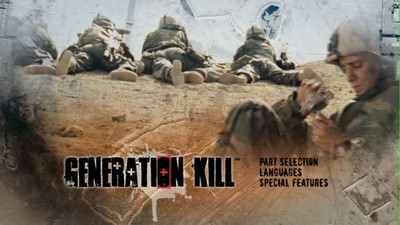
Given how politically charged the debate over the Iraq War has been, making a television show that depicts the soldiers in the field without lapsing into polemics would seem like quite a challenge, but the seven-part HBO drama Generation Kill manages to do just that. The show aired earlier this year, and despite being the brainchild of The Wire maestros David Simon and Ed Burns and based on the nonfiction book of the same name by Evan Wright, the series seemed to land with little hype and quiet critical applause. Hopefully now with all seven episodes being released as a 3-DVD boxed set, this excellent program will find an audience.
Generation Kill starts with the beginning of the invasion of Iraq in 2003 and follows the Marines in the First Recon Battalion through the early weeks of the war, up to and just beyond the taking of Baghdad. Though the scripts follow the full Battalion, from the highest rank on down, the main focus is on one Humvee in particular, the lead truck that carries the "scribe" into battle to show him the true face of war. Lee Tergesen ("Life on Mars") sits in for Evan Wright, and he rides with four of the major players in the tale: quiet gunman Cpl. Walt Hasser (Pawel Szajda); the trigger-happy rookie Lance Cpl. Harold James Trombley (Billy Lush, "The Black Donnellys"); Cpl. Josh Ray Person (James Ransone, Ziggy from The Wire); and Lt. Brad "Iceman" Colbert (Alexander Skarsgård, "True Blood"). In this small group, we see the varying tones of the soldiers, from Brad's cool-under-pressure manner (hence the nickname) to Ray's more manic and profane philosophizing to Trombley's insecurity-fused bloodlust. As most of these men's time is spent in transit, their job is filled with long stretches of nothing; the boredom leaves a lot of time to think, and given the trouble too much thinking can instigate, they off-set it by constant chatter. They might sing songs or trade movie quotes (a long stretch of episode 4 features unseen characters swapping Big Lebowski lines) or, in the case of Ray Person, launch into raunchy crackpot theories about how the war is really just a front for NAMBLA's need to replenish their supply of young boys.
Much of this talk also turns to personal insults, and Evan Wright and the show's other creators (Simon and Burns wrote most of the scripts, and the directing duties are split between BBC regulars Susanna Wright and Simon Cellan-Jones) don't shy away from any harsh topic that might arise in the course of this joking. Given that the Marines are very much a boy's club, the ongoing conversation reflects the worst of frat house barbs, including racism, homophobia, and misogyny. A brotherhood like this inspires a strange camaraderie, where each soldier has the other's back but can't afford too much sentimentality; thus, this kind of humor provides the connection while maintaining the tough exterior required for battle.
Likewise, a kind of gallows humor is required, one that also involves discussions of bodily functions. Though Generation Kill doesn't spend much time psychoanalyzing, the implication seems to be that, with death lingering--the possibility of killing or being killed--physical concerns, both scatological and sexual, become a priority. Thus, the constant chatter--the singing, the posturing--kills the time waiting between killing and being killed. The layers of jargon--and Generation Kill is thick with it, from the complicated codes and phonetic slang alphabet to the twisted nicknames the guy's christen each other with (the dangerously gung-ho captain is "Captain America;" Trombley becomes "Whopper Jr." after an unfortunate incident when he shoots a child, the etymology being "baby killer" to "BK" to "Burger King" to "Whopper Jr.")--give way to poetic flights of dialogue that makes Generation Kill the war genre's version of Deadwood. Flowery, circular language used to describe each situation in a manner analogous to the war's twisted, unchecked course.
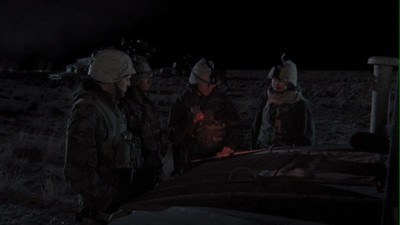
That unchecked, seemingly random course is what provides Generation Kill with its basic structure. Each of the seven episodes involves a new facet of the mission, which generally is just going from point A to point B, maybe to find out something specific or at times even acting as decoys, pawns to advance the career and reputation of the recon commander, Lt. Col. Stephen "Godfather" Ferrando (Chance Kelly), so named for his gravelly voice. The scripts go back and forth, up and down the ranks, to follow how the mess rolls down hill. Though the commanders often get the short end of the stick in their portrayals, there are really good and bad, competent and incompetent men in all facets of the organization. The thick foreheaded Capt. Craig "Encino Man" Schwetje (Brian Patrick Wade) may represent the worst of unqualified commanders, but by the same token, we also have Trombley, who at least at the start is of questionable ability.
Still, it would be hard to not see how much Generation Kill's sympathy lies with the men at the front of the line. As each mission plays out and the purpose of the maneuvers become more and more obscured, it's the guys in the Humvees who are always in the most danger and who see the consequences of what is being done. Displaced Iraqis encountered on the road and unintended civilian casualties tear at their morale with as much deadly force as a sniper's bullet. Watching them move across unmarked desert, we see these Marines in a kind of surreal pocket dimension, a separate world within our world. The men are both aware of the futility of much of their actions but totally committed to their duty. Getting something done is preferable to nothing at all, and there is no room for moral questions. The world seems topsy-turvy, with common sense only being available at the lower ranks while the upper ranks make mind-boggling decisions intent on bolstering their standing more than the logical steps needed to win a war. The grunts follow the rules given, it provides them safety and a reliable set of standards, only to see the rules changed when it suits command. Likewise, today's allies were yesterday's enemies. Like Vietnam, the locals shift their allegiances based on survival. This makes the bond amongst the men all the more important. (Ironically, this bond only breaks down during leisure time, with two fistfights erupting in a football game in episode 7. All the pent-up hostility has to go somewhere.)
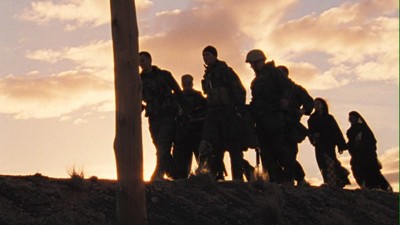
Manning a roadblock, Walt jumps the protocol and accidentally shoots a civilian driver. When the guilt threatens to do his head in, the Iceman, who is the embodiment of the Marine mantra "stay frosty," reminds him that this is just a job like any other, and no soldier can blame himself for doing it. If there is any message in Generation Kill, that would likely be it: that the men on the ground are performing a task, the right or wrong of which is up to others to decide. It may not always be pleasant, and it may not make sense, but this is the duty asked of them, and they must cope however possible. Generation Kill's commitment to an honest portrayal supports the troops in the best way possible--by being sympathetic to their work without making it look prettier than it actually is.
The filmmaking style of Generation Kill is gritty and of-the-moment, in that on-the-spot way David Simon pioneered back on Homicide: Life on the Streets and continued in The Wire. It's a mixture of documentary camerawork and traditional drama that creates a sort of hyperreality, working in conjunction with the complicated language to both immerse us in the experience and make us aware of the artifice. (Think The Thin Red Line without the dreaminess or use of the "golden hour.") From moment to moment, this aesthetic doesn't force the action so much as it just lets it happen, the way the writers don't work too hard to impose an overall structure on the series itself. Generation Kill follows the path of the one battalion, but the greater path of Iraqi Freedom lies somewhere beyond the boundaries of their map. Though the early Baghdad victory does provide a natural closing point, particularly since it's also when Evan Wright left the group, there is no forced arc or transformations. The men are affected, but how is something they can't know at that particular juncture.
That said, the filmmakers do find a rather poignant ending, one that captures the almost meta-quality of a war that has been so meticulously chronicled. Watching clips from the home movies one of the men has shot, edited to a Johnny Cash song, each soldier must confront the things he did in the heat of battle. With that temperature having cooled, the barriers are not as easy to maintain, and as each man reaches his threshold, he walks away. For as dirty a business as it is to be in, to watch it for pure entertainment's sake is dirtier still. Though Generation Kill asks us not to judge these warriors, it does ask us to reflect on what we demand of them rather than maintaining the safe distance that is our luxury.
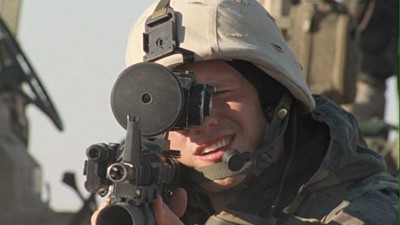
THE DVD
Video:
Generation Kill was originally broadcast on HBO in a widescreen 16:9 aspect ratio; that is maintained here, and the anamorphic transfer is of the usual high quality for the cable channel's DVD releases. The image is sharp with strong colors and good contrast. The grainy night scenes and sometimes blown-out sunny landscapes all look good, keeping the stark style as vibrant as intended.
Sound:
The English soundtrack is mixed in 5.1, and it is of exceptional quality. Generation Kill often has multiple actions going on at once, and the ambient sound of a battalion of marines is meticulously recreated. This means lots of talking and mechanical work going on in the background, which moves around the back speakers while the main action sits comfortably in the front.
Alternate audio options include a Spanish dub in 2.0 and subtitles in English (Closed Captioning), Spanish, and French.
Extras:
The three-disc Generation Kill set comes in a nicely designed box (about the same size as other HBO boxes like The Wire and Sopranos season sets) with a pull-out, multi-sided holder for the trio of discs. An unattached back cover sheet comes in the shrink-wrap, and there is also a 22-page booklet that features a map of the battalion's course, a breakdown of the chain of command, and a glossary of slang used in the series.
The same map that appears in the booklet is also on the DVDs as an animated version that can be viewed episode by episode to see the progress the Marines make from one show to the next. This runs across all three discs, tied to each episode. The individual shows also each have the "previously on" intro for those who might require it (they don't play automatically) and 6 of the 7 shows have audio commentaries. They are:
* Episode 1: David Simon, Ed Burns, and director Susanna White
* Episode 2: Ed Burns and producer Andrea Calderwood
* Episode 3: Evan Wright and actors Stark Sands and Benjamin Busch
* Episode 4: Actors Alexander Skarsgård and James Ransone, director Simon Cellan-Jones
* Episode 5: Evan Wright and military advisors/actors Erich Kocher and Jeffrey Carisalez
* Episode 7: David Simon and producer George Faber
The shifting cast of speakers keeps the commentaries from getting too monotonous. Some tracks are more dry than others (I'd have liked someone more lively than Faber on the last episode), but the actors show as much camaraderie off-screen as they do on, joking around and talking about the responsibilities they felt in portraying real guys. As far as giving us the background on the production and on the real-life events, you couldn't dig much deeper into how Generation Kill came together.
The shows on each DVD can be watched one at a time, or you can use the "play all" function.
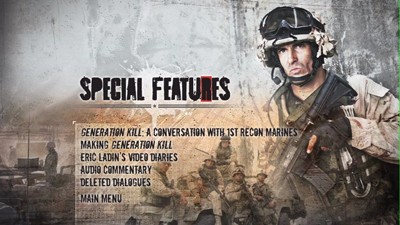
DVD 3 contains both the last episode of Generation Kill and the supplemental material for the set. There aren't a ton of extra features, but the quantity has given way to quality, and each bonus featurette is well worth watching.
"Generation Kill: A Conversation with the 1st Recon Marines" is a 23-minute chat between Evan Wright and a handful of the real soldiers the show portrayed, including Brad Colbert and Ray Person. The group talks about the truth of the shows and of Wright's reporting, as well as catching us up on where they are now. Two of the participating soldiers, Eric Kocher and Rudy Reyes, also served as advisors on the series and as actors, with Reyes playing himself. (He's the muscular soldier always making fancy coffee for the others.)
"Making Generation Kill" (25 minutes) is a fairly standard but substantial look at the production, featuring on-set footage and conversations with the cast and crew. The talk moves from the origins of the story and Wright's book to the actor's boot camp and how to recreate the reality of the war experience from the ground up, including sets, costumes, etc.
The final two featurettes are the half-hour "Eric Ladin's Video Diaries," an actor's personal video journal about his experience as part of the Generation Kill production, and "Deleted Dialogues," a collection of 5 audio clips of different characters in conversation. There is no explanation as to why these deletions only exist as audio and not with video, particularly as we can hear lots of background noise, suggesting that they were actually filmed.
FINAL THOUGHTS:
Following their massive critical success dealing with Baltimore crime in The Wire, writers/producers David Simon and Ed Burns have turned to Evan Wright's portrait of the Iraq War, Generation Kill. The seven-part series follows the course of one Marine Recon Battalion as they roll up and down the Iraqi landscape, gathering information while dealing with enemy forces and garbled messages that have trickled down the chain of command. Unrelenting and unvarnished, Generation Kill shows the harsh day-to-day of war without politicizing or imposing standard Hollywood drama. This new boxed set delivers the complete series in style, including substantial extras. Highly Recommended.
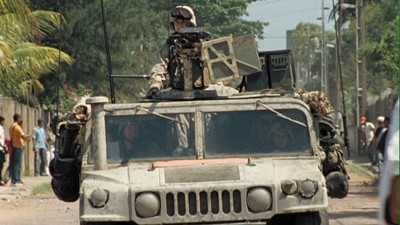
Jamie S. Rich is a novelist and comic book writer. He is best known for his collaborations with Joelle Jones, including the hardboiled crime comic book You Have Killed Me, the challenging romance 12 Reasons Why I Love Her, and the 2007 prose novel Have You Seen the Horizon Lately?, for which Jones did the cover. All three were published by Oni Press. His most recent projects include the futuristic romance A Boy and a Girl with Natalie Nourigat; Archer Coe and the Thousand Natural Shocks, a loopy crime tale drawn by Dan Christensen; and the horror miniseries Madame Frankenstein, a collaboration with Megan Levens. Follow Rich's blog at Confessions123.com.
|
| Popular Reviews |
| Sponsored Links |
|
|
| Sponsored Links |
|
|
| Release List | Reviews | Shop | Newsletter | Forum | DVD Giveaways | Blu-Ray | Advertise |
|
Copyright 2024 DVDTalk.com All Rights Reserved. Legal Info, Privacy Policy, Terms of Use,
Manage Preferences,
Your Privacy Choices | |||||||









